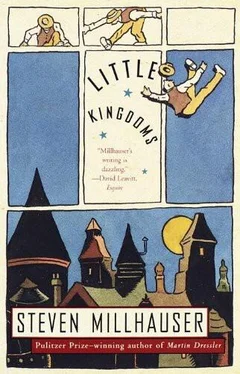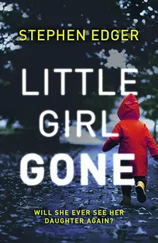He had established himself quickly at Vivograph, passing through the ranks and revealing a talent for direction and organization that had not gone unnoticed. When the head of the studio, a former animator who had become increasingly preoccupied with matters of business and was spending more and more time away from Vivograph, began to look about for someone to stand in for him and oversee daily operations, Max was the clear choice. His transition to virtual studio head was immediately successful. He hired three new animators and increased the production schedule from a biweekly to a weekly cartoon. But his particular talent was for detecting and eliminating wasteful steps in the animation process itself, while at the same time insisting on a high level of technical accomplishment. To this end he divided his animators into two ranks based on talent, limited the drawing of his chief animators to complex gestures, and introduced among his group of assistant animators a new and unheard of degree of specialization, assigning one man to avalanches, collapsing bridges, and storms at sea, another to mill wheels, stagecoaches, and windblown hats, a third to snowflakes and swarms of bees.
“Even so,” Max said as he rowed them back across the river, “my hands are tied. The big decisions are made by the high-muckety-mucks who pay for my meat loaf and mashed potatoes while they serve T-bone steaks to their pet poodles.”
“What you need,” Cora said, “is a studio of your own.”
“Exactly. I’ve talked to most of the guys about it and they’re with me to a man. Frankly, I’ve been nosing around for low-rent office space. Putting out feelers. Waiting for the right moment to jump ship.”
“Not now!” said Franklin, placing a hand on his chest and looking at the water in alarm.
As the excavation got under way, Max took to coming up each weekend in order to keep an eye on things. Franklin, whose weekends were devoted to work, was at first irritated at the prospect of weekend visits, and annoyed at his own irritation — what kind of friend was he, anyway? — but quickly felt a rush of gratitude to Max, who sternly insisted that everyone do what they wanted to do without fussing over him and who spirited Cora away for day-long outings, leaving Franklin free to bend over his animation board in the tower study, while Stella drew pictures of cartoon animals with her box of pastel pencils. Through the tower windows he could see down to the sunny brown river and, if he stood to the left of the right-hand window and looked out to the right, he could see, far up the river, Max’s pale new house rising among the dark trees.
Perhaps because he could see the house rising, perhaps because he was moving forward swiftly after several wrong turns, Franklin had the odd sensation that Max’s house and his own animated cartoon were springing up together under the rich blue summer sky. As the first-floor joists were laid and long floorboards began to be nailed diagonally over them, Franklin brought the doll up the stairs of the subway station onto the moonlit avenue. Under the oppressive height of skyscrapers, depicted in nightmare perspective, the doll seemed to grow smaller and smaller. A sudden storm burst out, driving the doll to huddle in a doorway as partition studs with door openings were raised and braced in place. Waves of rain blew along the avenue, halos of rain-haze glowed about the street lamps; and as the rain cleared and Franklin began the crucial scene in which the terrified doll slipped through the keyhole of a candy store and in the presence of tiny candy animals felt herself growing larger, the corner posts and outside wall studs began to rise among the dark trees.
“A perfect place for a picnic,” Max said, half-sitting on a sawhorse with his legs outstretched and crossed at the ankles as he carefully salted the top of a hard-boiled egg. Franklin and Stella sat on barrels facing a board set across two sawhorses. On the board sat plates of sandwiches, bowls of strawberries and purple grapes, a dish of hard-boiled eggs. Cora sat in a window opening, leaning back against the window stud with half-closed eyes and slowly raising to her lips a single plump grape. Through the second-floor joists shone slices of brilliant blue sky. The floorboards were striped with crisscross patterns of joist shadows and stud shadows. Curled wood shavings lay in a little heap beside Max’s sawhorse, and here and there lay a few shiny nails.
“Tell them to stop work,” Franklin said. “The rest is superfluous. Look, Stel, some pigs have lost their tails.”
“And this is the living room,” Max said. “Open, free — plenty of light. Exposed timber, everything simple and straightforward — none of your Queen Anne quaintness for Uncle Max. I’ve said it before and I’ll say it again: the shut-in family parlor has had its day. That’s the dining room over there, and through there’s the kitchen, big as a barn. I plan to cram it full of every up-to-date gadget on the market. And that room over there — it’s the American dream. I refer of course to the noble bathroom. I’m installing a tub the size of Grand Central Station, oak tank, siphon-jet bowl, brass trim, the works. Tell me a man’s house is his castle and I say hear, hear: but his bathroom is his church.”
“It might be a bit drafty,” Franklin said. “You might want to add walls.”
“How did they lose their tails?” Stella said.
Cora, stretching her arms slowly into sunlight, said, “What on earth are you talking about?”
“Hey,” Max said. “Off of there, buster. This is private property.” A squirrel, scampering along an overhead joist, stopped abruptly, its head erect, its front paws raised, as if it had been turned to stone.
“You haven’t lived,” Cora said, “till you have squirrels in the attic.”
“The workmen took off the tails by mistake,” Franklin said. “It happens sometimes. But luckily they left some nails behind.”
Something about the picnic disturbed Franklin, and that night in his tower study it came to him: he hadn’t looked back at the squirrel, which in his mind remained fixed forever on the joist, caught in an evil spell. His own work was progressing nicely. Out on the street the doll continued to grow, higher than the candy-store awning, higher than the candy store, while far up the river, horizontal boards rose along the walls and the outline of the roof took shape: king post and ridgepole and rafters. And still the doll continued to grow: higher than the Flatiron Building, higher than the Woolworth Building, until, placing one foot in the East River and one foot in the Hudson, she loomed above the island of Manhattan. Bending over, she picked up the little Brooklyn Bridge as tiny cars and trains spilled from the edges. She set the bridge down in Central Park, placed the Statue of Liberty on top of Grand Central Station, picked up the Flatiron Building and used it to smooth a wrinkle in her dress. Stella awaited each stage of the cartoon with quiet excitement; she had become quite skilled at detecting slight waverings caused by faulty alignment. Looking up, the gigantic doll saw the moon not far away. She removed it from the sky and began tossing it back and forth between her hands. Then she began to bounce it on rooftops like a white rubber ball, while through the right-hand tower window the house assembled itself as if it were the work of a skillful animator: red shingles spread across the roof-boards, a chimney rose into the blue sky. The final sequence was difficult: as the first light of dawn became visible the doll shrank swiftly down to her proper size and hurried back to the department store, to take her place on the shelf with her head leaning against the side of a puppet theater — lifeless as each of the drawings that composed an animated cartoon but, like them, irradiated by a secret. Max spoke of moving in by the first of September. Franklin, bothered by the subway sequence, began it over again.
Читать дальше












